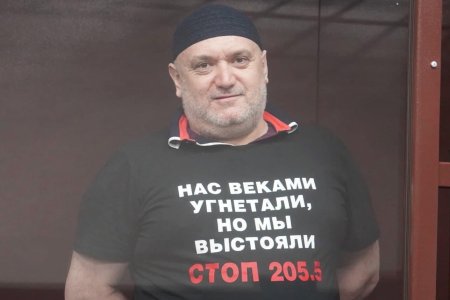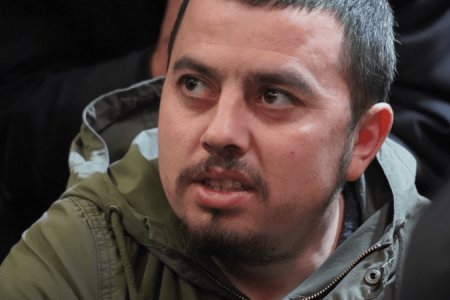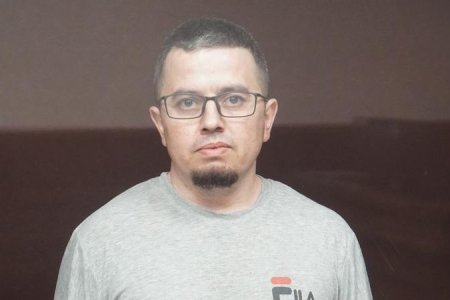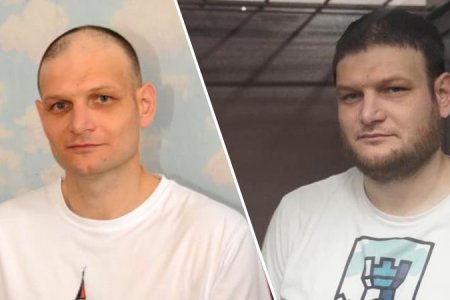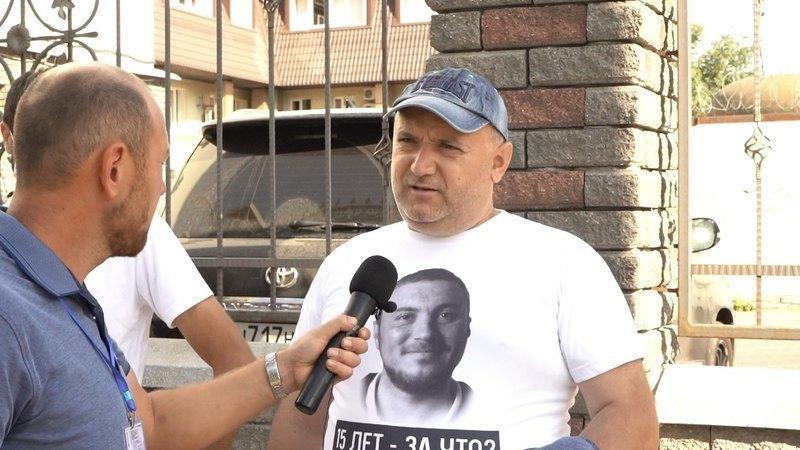
Russia is clearly determined to show that human rights defence in occupied Crimea is a swift and guaranteed road to prison. Even the ‘trials’, which were always a judicial farce, have now also become suspiciously fast-track. Of four civic activists, arrested in February 2022, one has already received a 17-year sentence and three others are facing similar terms of imprisonment, without any crime and on the basis of evidently flawed ‘evidence’.
The ‘trial’ of Ansar Osmanov (b. 1975) at the notorious Southern District Military Court in Rostov (Russia) is now coming to an end. On 9 March, prosecutor Sergei Aidinov asked the court to hand down a shocking 18-year sentence in a harsh regime prison colony, with the first four years to be spent in a prison, the absolute worst of all Russian penal institutions. This sentence is far worse than those often imposed on men who have committed murder or other violent crimes, and is based, even according to the ‘evidence’ presented by the prosecution, solely on a conversation in which the men discussed Russian persecution, as well as everyday and religious topics.
Osmanov, a father of five, has been in custody since 9 February 2022, although he is not accused of having committed any actual offence, and the armed search of his home that day found nothing that could justify the ‘terrorism’ charges that he is facing. His lawyer, Emil Kurbedinov, made it clear at the time that Osmanov had no illusions as to why he had been arrested. Yesterday, the civic activist had attended political trials, and today he himself had become the victim of political persecution. Osmanov is a member of the Crimean Solidarity human rights initiative which arose in response to the mounting persecution of Crimean Tatars and other Ukrainians under Russian occupation. It has played an invaluable role in ensuring that people, including abroad, learn what is happening in occupied Crimea. It is, undoubtedly, for this reason that a significant percentage of Crimean Solidarity civic journalists or activists are themselves now imprisoned, including one of its original coordinators, Server Mustafayev. Very many of them, including Osmanov, faced administrative prosecution first. When this didn’t stop them from speaking out about repression in occupied Crimea, they were arrested on ‘terrorist’ charges.
The charges derive solely from a flawed and suspiciously secretive Supreme Court ruling in 2003 which declared the peaceful transnational Muslim organization Hizb ut-Tahrir to be ‘terrorist’. Hizb ut-Tahrir is legal in Ukraine and in most countries, and there is no evidence that its members have carried out acts of terrorism anywhere. It is telling that Russia only began imposing large sentences for supposed ‘involvement’ in Hizb ut-Tahrir in 2013. In occupied Crimea, such charges are evidently targeting those with a pronounced civic position, and have been internationally condemned as an attempt to crush the Crimean Tatar human rights movement.
On the basis solely of the Supreme Court ruling, men are charged under Russia’s ‘terrorism’ legislation. Three of the four Crimean Tatars arrested on 9 February 2022, including Osmanov, are charged with the harsher of the two charges – Article 205.5 § 1 of Russia’s criminal code (‘organizing a Hizb ut-Tahrir group’). Russia is now also standardly adding the truly bizarre charge of ‘planning to violently seize power’, under Article 278, also on account of the same flawed and never explained Supreme Court ruling.
Osmanov rejects the charges. According to Kurbedinov, he told the court that he was well-aware of the activities of Hizb ut-Tahrir and considers that the Russian Federation unlawfully declared it to be ‘terrorist’.
The charges against Osmanov are based on an illicitly-taped conversation between him and fellow political prisoner Ernest Seitumerov, at the latter’s home. Both men were arrested on 9 February 2022, and charged under Article 205.5 § 1 with ‘organizing a Hizb ut-Tahrir group’ over the same conversation which, as mentioned, touched on religious subjects, as well as Russian repression. It is telling of the flawed nature of these prosecutions that the two men, charged over the same conversation, appear to be on ‘trial’ separately. It has long been known that the Russian FSB officers involved in these cases are rewarded with bonuses or promotion, in part because they can claim ‘success in fighting terrorism’. It is quite possibly for this reason that they squeezed two ‘trials’ out of one conversation, with the so-called ‘secret witnesses’ doubtless the same in both cases.
The defence in both men’s cases have provided an independent linguistic analysis of the so-called assessment of the taped conversation. Yelena Novozhilova is a qualified court expert who stated clearly that she found “no signs of any calls to violence or to terrorist activities” in the tape. This is important as the FSB invariably use the same alleged ‘experts’ who lack any professional competence, but can be trusted to claim that this or that word or utterance ‘proves’ involvement in Hizb ut-Tahrir.
Aside from a disputed interpretation of a conversation, the prosecution almost certainly cited two ‘prohibited’ religious books, claimed by the FSB to have been found at Osmanov’s home. The FSB invariably prevent lawyers from being present during their armed searches, and this time they even stopped Kurbedinov from reaching Osmanov’s home by disconnecting his phone. Although Osmanov’s family were shut away in the kitchen, his daughter did manage to see one of the men hiding two books under the mattress in the children’s room as they were just beginning their ‘search’. No devout Muslim would keep religious books under a mattress, but this is invariably ignored by the court, as are independent analyses of the conversations and quality of ‘expert assessments’.
In all such cases, the prosecution also makes use of ‘secret witnesses’, whose identity is concealed from the defence and whose ‘testimony’ cannot be verified. Unfortunately the court not only ignores the lack of any convincing grounds for allowing anonymity, but also regularly block questions from the defence aimed at proving that the ‘witnesses’ are lying.
The next hearing, at which Osmanov will give his final address, is scheduled for 28 March.
Please write to Ansar Osmanov!
The letters send an important message both to him and to Moscow. Letters need to be on ‘safe’ subjects and in Russian. If that is a problem, the letter below (copied by hand) would be fine.
Здравствуйте,
Желаю Вам здоровья, мужества и терпения, надеюсь на скорое освобождение. Простите, что мало пишу – мне трудно писать по-русски, но мы все о Вас помним.
[Hi. I wish you good health, courage and patience and hope that you will soon be released. I’m sorry that this letter is short – it’s hard for me to write in Russian., but you are not forgotten. ]
Address
344022, Россия,, Ростовская обл., г. Ростов-на-Дону, ул. Максима Горького, 219, ФКУ СИЗО-1
Османову, Ансару Исмаиловичу, г.р. 1975
[Or in English
344022 Russian Federation, Rostov on the Don, 219 Maxim Gorky St, SIZO-1
Osmanov, Ansar Ismailovych, b. 1975]
